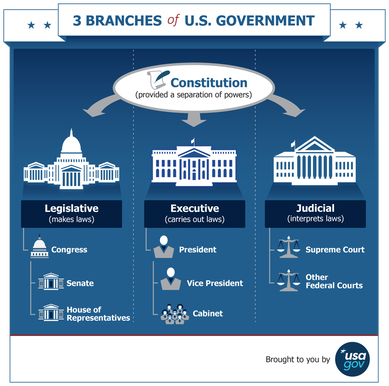|
The United States is a democratic nation ruled by law. We expect accountability to laws that are publicly promulgated, equally enforced, and independently adjudicated. In Sherry Chen’s fight for justice and fairness, we must understand and respect our system, and yet know the law and our rights to fight for justice and fairness. When public trust and given authority are misused and abused, Sherry Chen is courageously leading the way to make use of available resources, seek the facts and truth, and hold the responsible parties accountable. It is a fight for not only herself, but for all Asian Americans being profiled or targeted.
All the materials contained in this section are in the public domain. The Sherry Chen Legal Defense Fund is not a law firm. It does not provide legal advice or assistance. Each situation may be different and unique. We share the knowledge on rights and resources that have been applicable to Sherry Chen and may be useful to others under similar situations who may find them useful. |
U.S. Government
|
The legislative branch drafts and makes laws, confirms or rejects presidential nominations, federal judges, and the Supreme Court. It includes Congress (the Senate and House of Representatives) and support agencies and offices.
|
The executive branch carries out and enforces laws. It includes the president, vice president, the Cabinet, executive departments, independent agencies, and other boards, commissions, and committees.
|
The judicial branch interprets the meaning of laws, applies laws to individual cases, and decides if laws violate the Constitution. It's comprised of the Supreme Court, Courts of Appeal, Districts Courts, and other federal courts.
|
|
CAPAC

The Congressional Asian Pacific American Caucus (CAPAC) is comprised of Members of Congress of Asian and Pacific Islander descent and members who have a strong dedication to promoting the well-being of the Asian American and Pacific Islander community.
|
Merit Systems Protection Board

The Merit Systems Protection Board (MSPB) is an independent quasi-judicial agency in the executive branch established in 1979 to protect federal merit systems against partisan political and other prohibited personnel practices and to ensure adequate protection for federal employees against abuses by agency management.
|
U.S. District Courts

The U.S. District Courts are the entry level of most lawsuits. There are 94 judicial districts in 50 states and territories. Ohio has two District Courts - Southern and Northern. The Southern District Court covers 48 out of Ohio's 88 counties. District Courts have no appellate jurisdiction.
|
Selected Laws
|
Federal Tort Claims Act (FTCA)
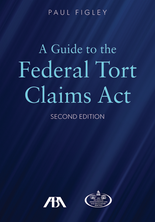
The Federal Tort Claims Act of 1946 and its amendments permit private parties to sue the United States in a federal court for most torts committed by persons acting on behalf of the United States.
Under the FTCA, the U.S. government is liable in the same manner and to the same extent as a private individual under like circumstances with some limitations. In general, Federal courts have jurisdiction over tort claims. |
Freedom of Information Act (FOIA)
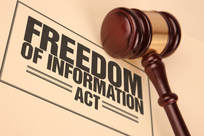
Since 1967, The Freedom of Information Act (FOIA) and its amendments have provided the public the right to request access to records from any federal agency.
The FOIA law keeps citizens in the know about their government. Federal agencies are required to disclose any information requested under the FOIA unless it falls under one of nine exemptions which protect interests such as personal privacy, national security, and law enforcement. The public may file, track, and appeal FOIA requests online through FOIAonline.gov. |
|
Inspector General (IG) Act
|
Economic Espionage Act
|
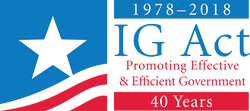
The Inspector General Act was signed into law by President Jimmy Carter in 1978. The law created independent and objective Inspector Generl organizations to:
|
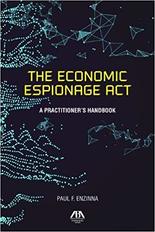
The Economic Espionage Act was enacted on October 11, 1996. It covers a wide range of issues, but a primary purpose of the act is to make the theft or misappropriation of a trade secret a federal crime. The offense involves commercial information, not classified or national defense information.
In particular,
|
|
Computer Fraud and Abuse Act
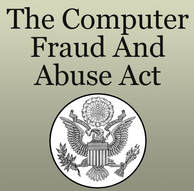
The Computer Fraud and Abuse Act (CFAA) is a U.S. cybersecurity bill enacted in 1984 as an amendment to existing computer fraud law (18 U.S.C. § 1030), which had been included in the Comprehensive Crime Control Act.
The law prohibits accessing a computer without authorization, or in excess of authorization. Prior to computer-specific criminal laws, computer crimes were prosecuted as mail and wire fraud. In theory, the CFAA covers only "protected computers." In practice, any ordinary computer has come under the jurisdiction of the law, including cellphones, due to the inter-state nature of most internet communication. |
Making False Statements
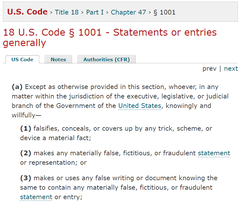
Making false statements is the common name for the United States federal crime laid out in Section 1001 of Title 18 of the United States Code, which generally prohibits knowingly and willfully making false or fraudulent statements, or concealing information, in "any matter within the jurisdiction" of the federal government of the United States, even by merely denying guilt when asked by a federal agent.
This statute is used in many contexts. Most commonly, prosecutors use this statute to reach cover-up crimes such as perjury, false declarations, and obstruction of justice and government fraud cases. |
Analysis, Data, and Other Resources
|
White Paper: Prosecuting Chinese "Spies"
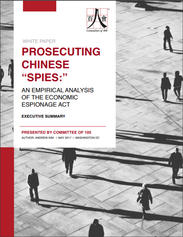
In this 2017 White Paper, Andrew Kim reported on the results of his empirical analysis of all known prosecutions under the Economic Espionage Act at the time. It was published by the Commitee of 100.
In particular, large disparities were found between individuals with Asian names and non-Asian names in the number and percentage of prosecutions, dismissed cases, disposition of charges, and penalties when convicted. |
Law Journal Article: Prosecuting Chinese "Spies"

This Study published in 2018 provides the first systematic empirical analysis of racial disparities in DOJ prosecutions for espionage.
It reveals significant disparities in the rates at which people of Asian descent are prosecuted for espionage and the outcomes of those prosecutions. It finds, inter alia, that Chinese and other Asian defendants are twice as likely to be innocent as those of other races. It then offers insights into the possible causes of those disparities, including benign causes, and identifies specific opportunities for reform. |
|
Data on Prosecutions under the Economic Espionage Act

FedCases is a web-based repository of all known prosecutions under the Economic Espionage Act since its enactment in 1996. It is updated continuously when new information becomes available from the Department of Justice, Public Access to Court Electronic Records, and media reports.
Andrew Kim made major contributions to the creation of this database, which led to his 2017 White Paper. |
PACER
Public Access to Court Electronic Records (PACER) is an electronic public access service that allows users to obtain case and docket information online from federal appellate, district, and bankruptcy courts, and the PACER Case Locator. PACER is provided by the Federal Judiciary in keeping with its commitment to providing public access to court information via a centralized service.
The public can register for a PACER account at no cost, but there may be charges in your viewing or downloading court documents. |
|
End National Security Scapegoating Coalition

The End National Security Scapegoating Coalition is composed of several Asian American organizations and serves to combat and end racial profiling of Asian Americans under the pretext of national security, continuing its previous work on the "Scientists Not Spies" campaign.
It provides six guiding principles, demanding accountability from the government. The Coalition offers legal resources including these "Know Your Rights" guides: |
Book: Three Felonies a Day
How the Feds Target the Innocent 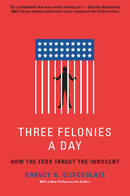
Three Felonies a Day: How the Feds Target the Innocent. Three Felonies a Day describes how the U.S. Department of Justice targets all segments of civil society by means of abusive prosecutions based upon unacceptably vague federal criminal statutes and regulations.
The average professional in this country wakes up in the morning, goes to work, comes home, eats dinner, and then goes to sleep, unaware that he or she has likely committed several federal crimes that day. Why? The answer lies in the very nature of modern federal criminal laws, which have exploded in number but also become impossibly broad and vague. In Three Felonies a Day, Harvey A. Silverglate reveals how federal criminal laws have become dangerously disconnected from the English common law tradition and how prosecutors can pin arguable federal crimes on any one of us, for even the most seemingly innocuous behavior. |
|
|
Constitutional Rights and Government Actions
On June 28, 2017, Dr. Jeremy S. Wu spoke about the racial targeting by the US government against Asian American scientists including Ms. Sherry Chen and Dr. Xiaoxing Xi, and the constitutional rights every citizen should know. Michele Young, who recently became a co-counsel in Sherry Chen's FTCA lawsuit, also spoke in the session which was sponsored by APAPA and CLF Foundation.
| ||||||
Amicus Briefs

2017/06/29 American Bar Association: Amicus Briefs: How to Write Them, When to Ask for Them
Friend of the court, or amicus curiae, briefs are often filed in appellate cases heard by the U.S. Supreme Court and state supreme courts, as well as intermediate courts of appeal. And there is considerable evidence that amicus briefs have influence: Appellate courts often cite to them in issuing their decisions. One study showed that between 1986 and 1995 the U.S. Supreme Court referred to at least one amicus brief in 37 percent of its opinions; another study revealed that state supreme courts acknowledged or cited amicus briefs in 31 percent of cases and discussed arguments made in amicus briefs in 82 percent of the cases sampled. |


